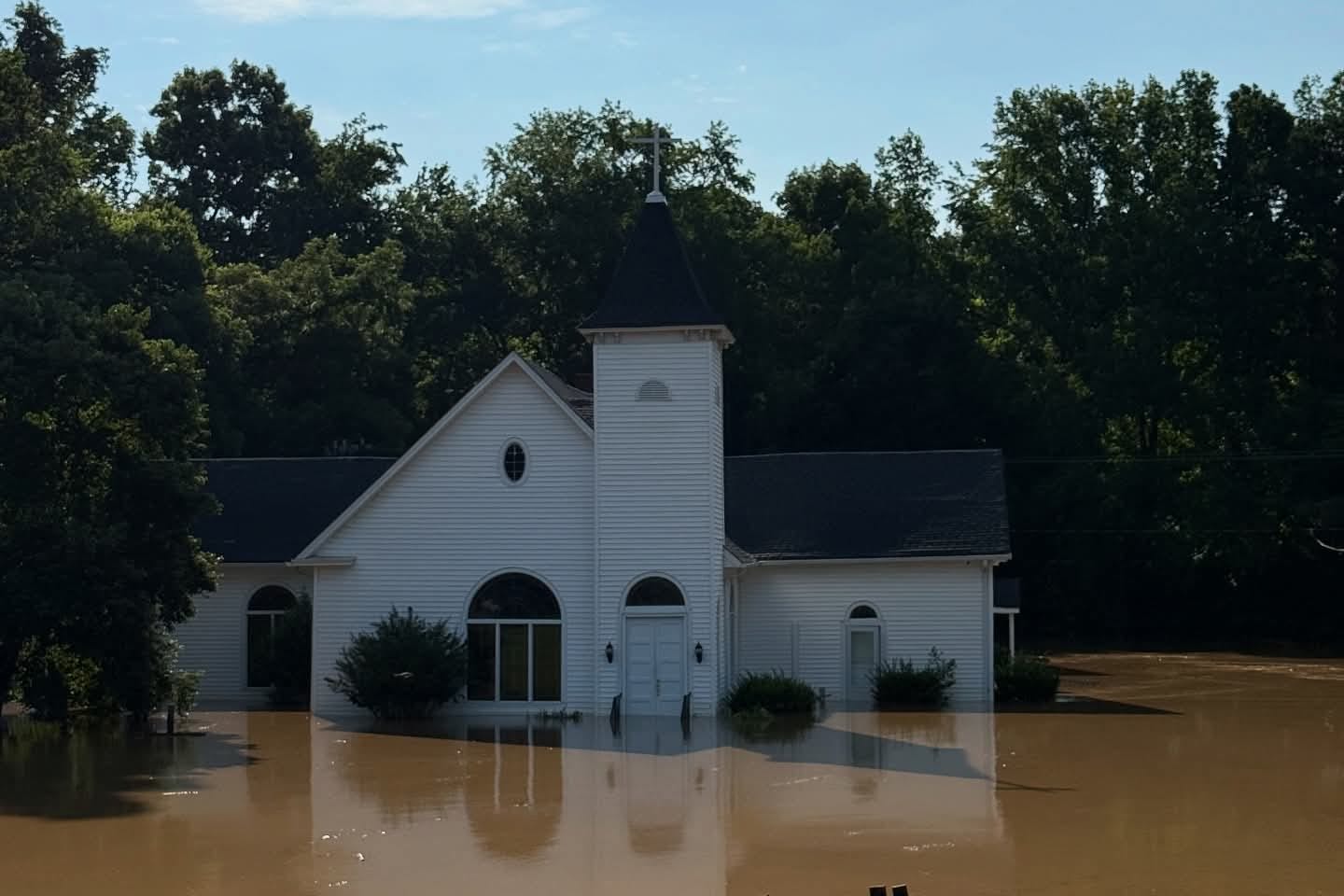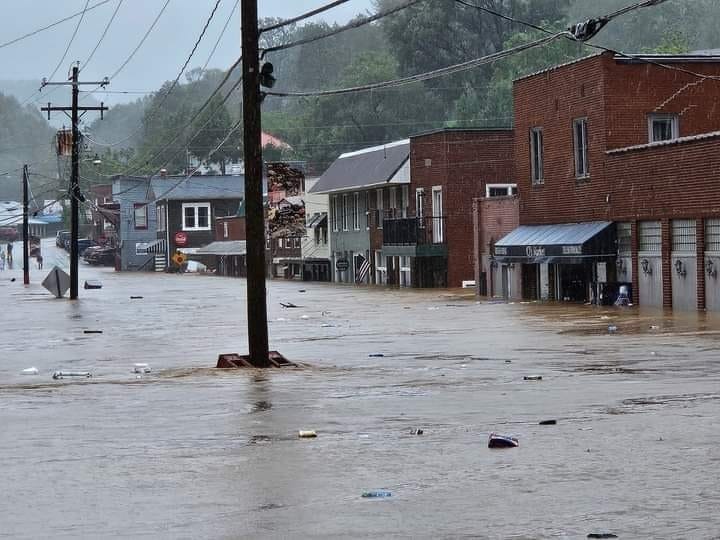Higher Ground
Floods, climate, and class.

I text my mom because I know my dad won’t reply. He probably left his phone on his workbench hours ago and has his hearing aids out already.
Mom says they moved the car, the water was already up to the bumper, but I say they also need to put the seals up over the basement windows, the ones they had made a few years ago when it became clear that the rising water was going to come every year, just like the prayers for it to go back down.
I refresh the weather radar and look at the line of storms. Rain is dumping outside, pooling up in my yard. The red and yellow blobs on the radar usually travel north up 29 to Virginia, and the rain from my home arrives at my parents' two hours later.
I worry, of course, my dad with a cane and their home just a block from the Appomattox.
My gutters are overflowing and the water is dumping onto my new porch boards, the ones Jose cut so precisely and I haven’t yet sealed. Those gutters have need replaced since I bought the house, but the truck has needed new tires, and the kid needed running shoes, and for fucks sake my friend Rebby just lost her hotel room and is living outside again. She’s living in a tent pitched between two roads, hidden in the trees by a creek.
I text Rebby. She assures me she is watching the creek. I wonder how well she can do that in the dark; she needs to sleep at some point. I tell her to make her way to my house if it looks like the water is rising, and she says she will. I try to keep boundaries, and Rebby never pushes them, no matter how hard her situation. I try to keep my house just me and my kid so it’s calm and quiet, but it’s hard when you live brushed up against poverty and have to look it in the eye. I wonder if moms who live in neighborhoods where they pull their cars into garages and walk straight into their kitchens have friends who sleep in creek beds and, if not, who they worry about when it rains.
An hour southeast of me, Saraj says the water is up to her neighbor's house. I try to remember the topography of her street; she’s between Roberson Creek and a bigger road that runs out to a gas station. We took the kids to the creek one day, it wasn’t but a few minutes walk from her house, and I don’t remember the path being steep.
We are becoming amateur topographers, meteorologists, hydrologists– trying to make sense of how the clouds move and the rain flows. We are studying the mountain tops for signs of slippage; our favorite sunbathing rocks are now submerged under brown water, and we are finding new places to swim.
For all that we don’t know about weather patterns, we do know about packing up cars and moving belongings. Nine months ago, Sara was figuring out how to get to her daughter in Swannanoa after Hurricane Helene; four months ago, she was on her way to her parents in West Virginia after floods tore through their hollers. Monday, I was hauling bottled water in my Toyota to Alamance County; last fall, I was hauling blankets to Buncombe.
We’ve always known about rising water; we’ve always gone to work in the rain. Housekeepers have always huddled under shared umbrellas at the bus stop; bricklayers have always knocked their boots off at the back door; farmworkers have always mucked through the swollen rows of sweet potatoes to save their bosses' crops. There’s always been hillers and creekers; upstairs and downstairs; owners and workers; haves and have-nots. The people at the bottom have always been flooded the hardest; the poor have always drowned first. Because we live on the leftover land, we’ve long known how to live doubled up with our cousin's family when the flood of gentrification comes; we’ve long known how to pick up odd jobs when the factory gets swept away in the tide of free trade.

But the water is now rising all around us- and around all of us. Two hours north, thirty minutes east, an hour west. It's not just coming over the banks of the river, but backing up in the storm drains of landlocked places designed long before these heavy, dark clouds of climate change began to rumble. What do working people do when we can no longer migrate? When we can no longer trudge North to cooler weather, cleaner water, dryer land, freedom? When we can no longer call our soggy acres a loss and place our bets out west? That is how working people for a millennium have endured; we’ve cut our losses, saddled up our horses, and started again. But now, what do we do when we are all hemmed in?
These floods– Helene taking the leaves off trees and collapsing the highway, the breathtaking speed of water along the Guadalupe, the day after day soaking of tropical storms so frequent they are running into each other and I can’t keep track of their dates or names– they aren‘t just hitting the poorest of us, but now are pulling down the mountains under the Hillers and backing up the drains of Biltmore. They aren’t just the Buffalo Creek Disasters sending sludge down on the miners ’ families and the brown water of Katrina swallowing up New Orleans, these storms are now creeping in on the millionaire’s mile and Mar-a-Lago, too.
I find myself hoping that all this water will be Biblical, washing over us as an equalizer, a reminder that all cars’ engines seize up when submerged, that the windows of shacks and mansions are both made of glass and a flash flood breaks through them the same. I think, maybe now, now that we are all scared, maybe now they will install the sirens, maybe now they will rebuild the dams, maybe now they will cap the carbon, maybe now they will protect public lands, maybe now they will preserve the forests, maybe now we will be reborn.
But they don’t. Instead, they build a wall so that those fleeing cannot get in or get out. Instead, they tell us not to trust our neighbors, that there isn’t enough to go around, to fend for ourselves. Instead, they say they are building a rocket, a rocket that will blast away from this dying planet,186.53 million miles to Mars, but that there are only enough seats for them to get on.

There are other ways. We see it down here, amongst the creekers, the laborers, the single mothers, the grandparents living on social security, every time we are washed over. Day laborers and camp counselors tie ropes around their waists and wade out into the raging water; farmers with tractors and builders with skidloaders clearing debris; strangers show up in a 1997 Ford Ranger and haul off our moldy carpet; grandmothers set up laundry lines and anarchists deliver food boxes; hillbillies and immigrants make sandwiches for our children.
Every time it floods, I’m reminded that we are the ones living on higher ground.



How do you make a flood deadlier? Assemble a team like the TEXAS MAGA SQUAD.
https://thedemlabs.org/2025/07/10/texas-flood-tragedy-made-worse-by-doge-cuts-and-incompetent-maga-sqaud/
Very nicely written. Same same with fires in the west. How to deal with the mounting crisis: Cut funding for weather satellites, forecasters, and firefighters. Remove all references to climate change from government websites. Don't look up.